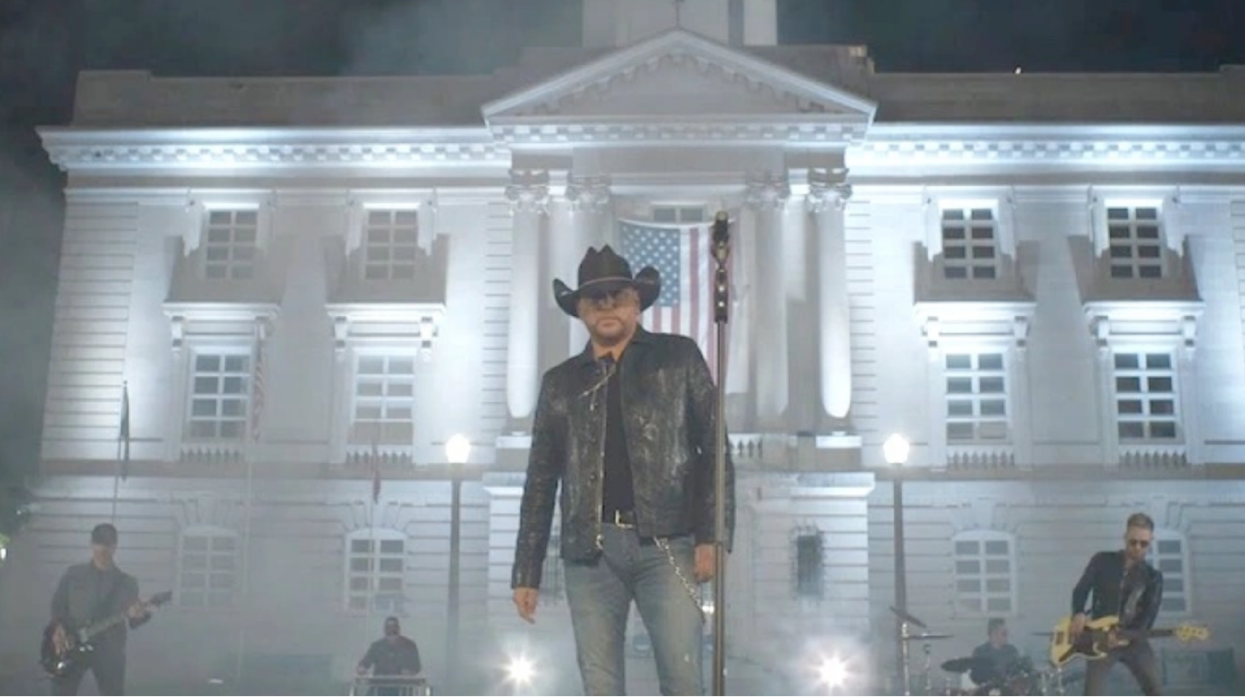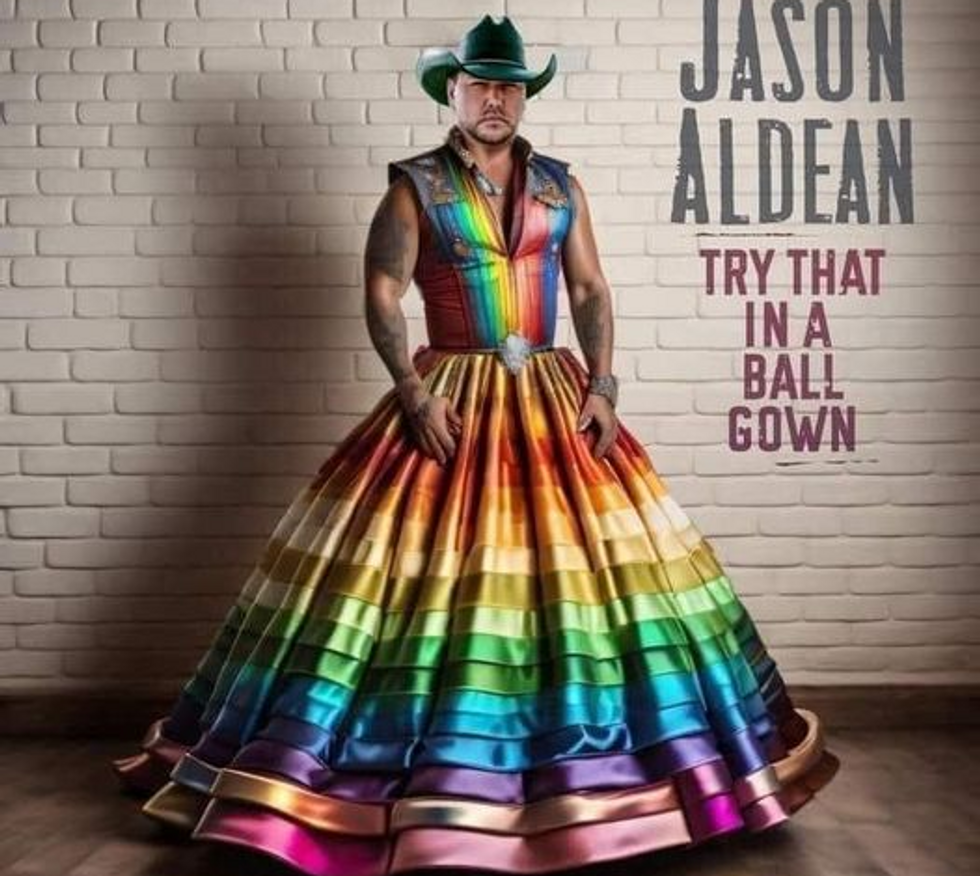
Predictably, Aldean denies this. While the song was released in May, the video – and outrage – wasn’t released until July 14. “When u grow up in small town, it’s that unspoken rule of ‘we all have each other’s backs and we look out for each other,'” he wrote at the time. “It feels like somewhere along the way, that sense of community and respect has gotten lost…I hope my new music video helps y’all know that u are not alone in feeling that way.” Cue wizened old guy in video musing “what this community and a lot of farm communities stand for – somebody needs some help, they’ll get it.” Awww. That sounds so sweet. Given the song’s menacing imagery and belligerent rhetoric – “Ya think you’re tough/ Well, try that in a small town…You cross that line, it won’t take long/For you to find out…Try that in a small town” – it also sounds like disingenuous bullshit, ugly light years away from “community” and “respect.” Aldean’s “angry cocktail” of country music, willful blindness, nostalgia and paranoia about anything “other” or “from away” – Nikki Haley’s pining for the “simple” days of “faith, family and country” when marginalized people had no rights – is a perfect, heedless distillation of what MAGA world wants this country to be: Make America White (also straight and Christian) Again.
As usual, rural (white) towns play a key role in this well-burnished mythology, serving as the defenders of America’s heartland against a perilous, communist, dystopian landscape – big cities, bad crimes, foreign food, weird ideas, dirt, noise, people of color. But painting small-town America as a pristine, peaceful utopia is more bullshit. In small towns, poverty, unemployment, domestic violence, lack of health care, boarded-up businesses, mean-spirited scapegoating of “others” and the opioid/fentanyl epidemic are rampant; food deserts are growing, farm communities are shrinking; vigilante justice still isn’t justice, and local politics are often inept, corrupt, racist, rich-centric like the rest of the country. Deaths from the “unholy trinity (of) cars, guns and drugs” are 20% higher in rural small towns than big cities. Gun violence is everywhere: Uvalde, Newtown, Parkland are small towns, their shooters were young local (white) men, the Las Vegas shooter was an angry white man from Iowa, 2/3 of all fatal shootings involve rural white men – who often shoot themselves – with no “marauding bands of BLM protesters” in sight, and to paint gun violence as a big-city, left-leaning issue is “dog-whistling past the graveyard.” It’s also, says Nashville’s Sheryl Crow, “just lame.”
The country music that supposedly represents these communities likewise boasts its own hypocrisies, discrepancies and racist history. An art “created around whiteness,” its executives segregated country music from the start into “race music” and “hillbilly music,” thus perpetuating a white-dominated genre that “borrowed from Black musicians but rarely centered on them,” or even gave them credit. While it long had its progressive exceptions – Jimmy Rodgers, Mother Maybelle Carter, Johnny Cash, Dolly Parton, Willie Nelson, Loretta Lynn, Charley Pride, with many more upcoming – it was historically reactionary. Enter Aldean, dubbed by some country purists “barely a country artist” but more a “mid-tempo arena retro rocker” whose hot new song is “a clownish, poorly-written, trite and reactionary piece of audio refuse,” a “dated, untimely, unnecessarily strident… grandstanding embarrassment” without charm and a “poorly-attempted cultural statement that has clearly proven counter-productive,” though it’s making tons of money “being marketed well to people with terrible taste in music.” The song is now #1 on Billboard’s Hot Country Songs, with views of the video soaring from 350,000 to 16.6 million. Capitalism loves controversy – and evidently lots of lies.
Aldean, it turns out, may be crazy about small towns, but he’s not from one, nor does he live in one. He grew up in Macon, where he attended private school, and he lives in Nashville, a city of over 700,000. He also doesn’t write his own songs – “he picks them out of a catalog like a karaoke singer” – nor did he write this one: It’s written by Neil Thrasher, Kurt Allison, Tully Kennedy and Kelley Lovelace, “none of whom are Jason Aldean,” so “you’d have to ask them if it’s about Blacks, Jews, Antifa, homeless people, or they’re just mad some teenager stole their flag.” “What we have here is a prep school dilettante who was raised in a big city, singing a song he didn’t write, about an experience he never had,” writes Noah Berlatsky. He adds the song nonetheless remains “ugly and evil (because) Aldean is in fact speaking for an American tradition (that) is not limited to small towns but very much includes them, and Aldean remains “a garbage fire of a human being.” Still, he questions condemning Aldean as a fake, thus conflating authenticity with morality: “It’s odd to criticize a racist for not being true to his racist posturing, for not being the rugged small town bigot of his songs.” At some point, he suggests “we stop caring so much about who is ‘real’ and start caring more about who is good.”
The consensus: Aldean’s neither. After a few days of backlash, Country Music Television pulled the video. Aldean squawked the critiques were “meritless,” he doesn’t even mention race and, “Cancel culture is a thing…if people don’t like what you say, they (try) and ruin your life, ruin everything.” More squawking from the loathsome likes of Marcia Blackburn – “I stand with Jason Aldean” – Jesse Watters – “(This is) “open season on all of us” – and lying Sarah Huckabee: CMT “caved to the woke mob.” Then the video re-appeared, with BLM protests edited out. Meanwhile, Aldean kept touring, whining and sounding like a vengeful, dumb-as-a-rock thug. In Boston, he inexplicably compared his song to the Marathon bombing: Boston should understand his message “better than anybody…Any of you guys that would’ve found those guys before the cops did, I know you would’ve beat the shit outta them…It’s about people getting their shit together and acting right.” In Hartford on Sunday, protesters gathere – “There is comfort in breaking bread together” – to don gowns and bear photos of Aldean in rainbow glory: “Try That In A Ball Gown.” Critics had thoughts about “societal expectations” for the chunky singer. “I am sure he looked beautiful in that gown without the photo-shopping” and “the belt buckle really ties it all together.” Talk about taking care of our own.
Jason Aldean – Try That in a Small Town (Official Music Video) youtu.be
 Activists fixed the image of Aldean with a rainbow ballgownTwitter/Reddit photo
Activists fixed the image of Aldean with a rainbow ballgownTwitter/Reddit photo
This post was originally published on Common Dreams.